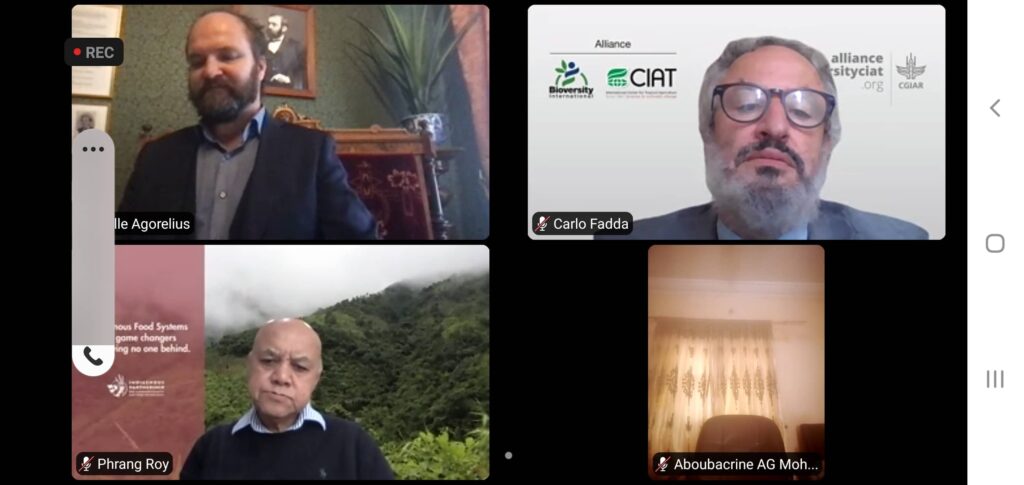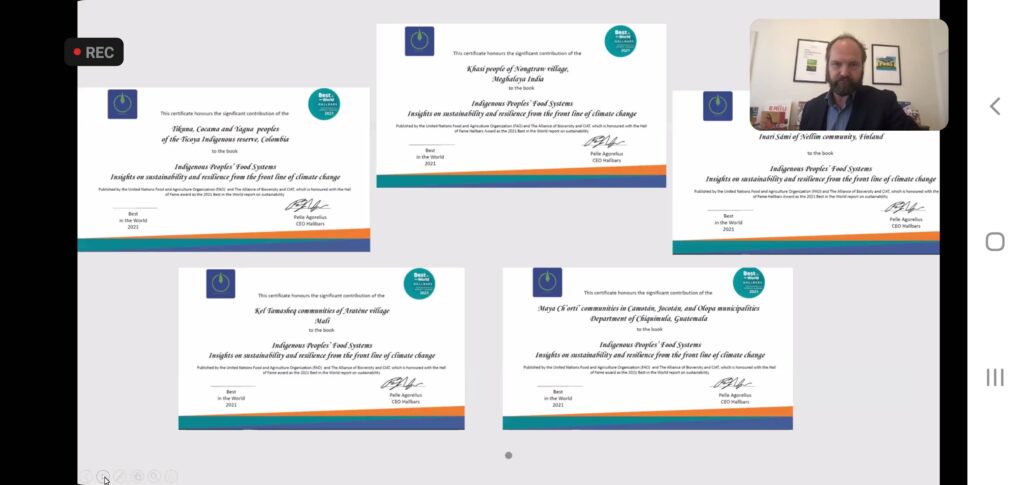Hallbars, a Sustainability Research Organisation awarded the contribution of four individuals, organisations, and community from Meghalaya as part of the Best 2021 Sustainability Publication Award. The Indigenous Partnership (TIP), NESFAS, and the Khasi People of Nongtraw were among the 58 awardees for their contribution towards the award winning publication “Indigenous Peoples’ Food Systems: Insights on Sustainability and Resilience from the front line of climate Change.”
Speaking at the virtual award ceremony held on 30 September, 2021, Edouard Cointreau, President Hallbars, called the book as the book for the next 20 years. “The global food system will break down soon but indigenous systems have existed for centuries. This book is key for us because of the food systems crisis. It will be inducted to our ‘Hall of Fame.’” he remarked, addressing all the participants from across the globe. He also congratulated the overall effort of the co-authors, contributors and communities who participated and contributed towards the population.
Pelle Agorelius, CEO of Hallbars, hosting the award ceremony at the Alfred Nobel Museum, Sweden, likened the award winning publication and other sustainability reports as seeds of knowledge that can be handed down as documents for the generations that are to come. Khalid Bomba, Chief Innovation Officer, FAO congratulated all the contributors and thanked Hallbars for the award while reiterating FAO’s recognition of Indigenous Peoples as custodians of nutritious food systems and protectors of biodiversity.

Bah Phrang Roy Founding Chairperson of NESFAS & Coordinator of The Indigenous Partnership along with the other panelist at the virtual event
Among the many Indigenous Food Systems (IFS) that were documented, the shifting cultivation (jhum) practices in the Himalayan’s evergreen forest region of the Nongtraw village in East Khasi Hills constituted one of the chapters of the book. The chapter documented the Jhum practice, fishing and gathering food systems of the Khasi people of Meghalaya. A major factor behind the resilience of the Khasi IFS is the strong local governance which has the confidence of the community. Entitling the ownership of land to women who have a profound respect and understanding of Mother Warth has played a huge role in the Khasi community.
Bah Phrang Roy, who was one of the panelists in the event, shared, “While we must be proud of our systems, as Indigenous Peoples we must have the ability to acknowledge the help of non Inidgenous Peoples and organizations that gave us friends and supporters.”
“The Nongtraw community members, through their collaborative studies with NESFAS and FAO of the UN, have demonstrated that severe food insecurity is virtually non-existent in traditional food systems that have not been marginalized by cash crops like broom grass, and other unsustainable initiatives.” Bah Phrang Roy said addressing the local media in the aftermath of the award ceremony.

Nongtraw among the recipients of the Prestigious Hallbars Sustainability Publication Award 2021 Certificate
“It is through the guidance and efforts of Bah Phrang Roy that our Indigenous Food System has made its mark in the global arena.” He expressed on the back of NESFAS’ invaluable contribution to the award winning publication.
Bah Pius also praised all the community members of Nongtraw village who had taken part wholeheartedly in the study and especially acknowledged the role of (Late) Bah Horno Dohling, who recently passed away: “He was a great leader of the community as the Headman during the study and his legacy lives on.”
Last of all, Bah Pius expressed his elation on an organisation such as Hallbars recognising and awarding the contribution of a grassroots level organisation like NESFAS and conveyed his gratitude to the whole NESFAS team.
“All of this would have not been possible without the team members of NESFAS who have worked diligently to make this happen. This shows that there is a ray of hope for us as an organization, and we will need the support of the people to move forward and achieve the sustainable future and wellbeing that we want.”
 Translate
Translate




